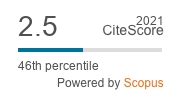Simple and Efficient Signature-based Consensus Protocol in the Asynchronous Distributed System
DOI:
https://doi.org/10.5755/j01.itc.41.2.931Keywords:
distributed consensus problem, oral message, signed message, dormant fault, malicious fault and groupingAbstract
The consensus problem in distributed systems is mainly solved by message exchange. Most of past consensus algorithms rely on exchange of oral messages to achieve consensus among processors. As oral messages are susceptible to influences from malicious attackers, this type of consensus protocols usually requires a large number of rounds of message exchange, and the complexity of message exchange is also excessively high. In light of this drawback of oral message-based consensus algorithms, some scholars proposed signed message-based consensus algorithm to reduce the number of rounds of message exchange required. However, some signed message-based consensus algorithms still have certain drawbacks which make them ineffective in some conditions. To address this issue, we propose a new signed message-based consensus algorithm in this paper. We integrate the concept of grouping into the proposed algorithm and find the best number of groups through mathematical analysis to further reduce the rounds of message exchange required. In other words, the proposed algorithm makes use of digital signature and the concept of grouping to solve the consensus problem. This algorithm can not only increase the fault-tolerance of distributed systems but also significantly reduce the rounds of message exchange required to achieve consensus.Downloads
Published
2012-04-26
Issue
Section
Articles
License
Copyright terms are indicated in the Republic of Lithuania Law on Copyright and Related Rights, Articles 4-37.





